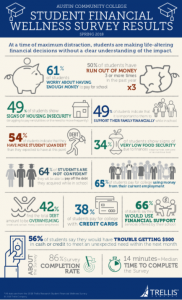If you’ve traveled to England and ridden the London Underground, you are probably familiar with the phrase “mind the gap”. While that advice is intended to make sure that passengers step over the gap between the platform and the train, it has always made me think about the gaps that we tend to ignore or overlook or think we can’t change.
ACC recently conducted a survey of our students with the help of the Trellis Company, and we found out that our students face a variety of gaps in their financial wellness. Among the ACC students who participated, some said that they have run out of money three or more times in the past year, that they worry about paying off their stud ent loan debt, that they financially contribute to their families while they are in school, and that they pay for college with credit cards.
ent loan debt, that they financially contribute to their families while they are in school, and that they pay for college with credit cards.
Those are gaps for our students that we should be aware of and responsive to. I attended the Texas Pathways Institute last week and heard from Sara Goldrick-Rab, a sociologist of higher education who reminded us that we are serving many under-resourced students from under-resourced families in under-resourced communities. She reminded us that scarcity can have cognitive impacts – it can weigh students down in ways that make it difficult to study or make good decisions. She told us that students enduring poverty spend as much time on college as other students, but more time working and less time sleeping.
Dr. Goldrick-Rab made the following recommendations while also affirming that our students are resilient and capable. Her advice:
Step 1: Remember, students are humans first.
Step 2: Commit to a culture of caring that goes beyond charity. Change systems, policies, and practices where necessary (such as our new syllabus language that alerts students to available resources).
Step 3: Ask questions. Learn what resources are available so that you can direct students to them.
Step 4: Share what you learn about available resources.
Step 5: Gather and share data (as with our Trellis survey). But we must also share our students’ stories. We must remember that a student who falls asleep in class isn’t necessarily being disrespectful – it could be s/he just finished a night shift, or is working two jobs, or was up half the night with a sick child. We must remember that students are humans first.
So, to get you started on the resource list, here are a few links.
Did you know we have a student emergency fund?
Did you know we have food pantries?
Did you know we have a support center that provides help with childcare or textbooks?
Did you know we have a rainy day savings program for students that matches money saved?
Please take the time to learn about the resources that we make available to help our students. Let’s all do what we can to mind the gaps that our students face.
Wishing you a happy Thanksgiving and a season of blessings.
